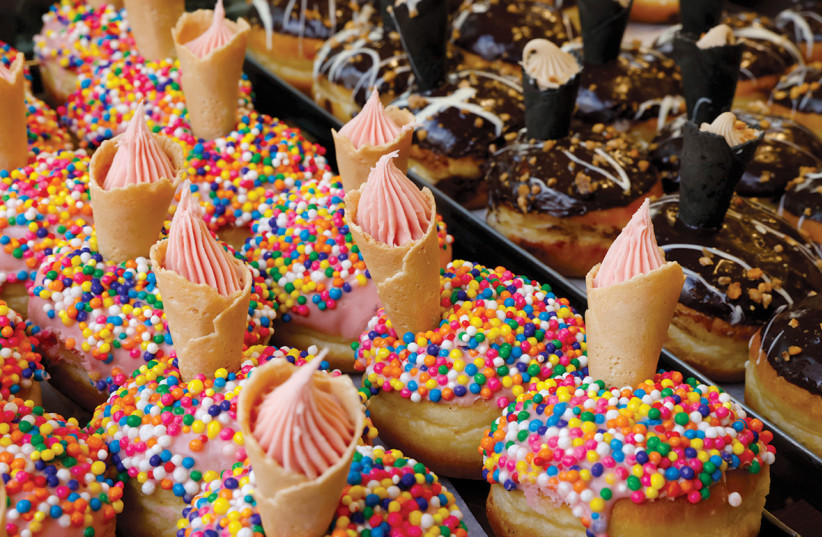The happy, eight-day Jewish holiday of Hanukkah that begins on Thursday night and is marked with nightly candle lighting, special prayers, and eating foods fried in oil, would seem to be harmless from a safety point of view, but the Israel Institute for Occupational Safety and Health (IIOSH) warns us otherwise.
Every year, Israelis buy over 30 million sufganiyot during the festival, and a significant number even a month before by those who crave them. Sufganiyot are soft, round pastries that are fried or baked, and sometimes filled or decorated, that are traditionally made and eaten during Hannukah.
Besides the ones made at home, they are made by teams of bakers working around the clock. Alongside the joy, there are also risks of slipping, burns from hot oil, and respiratory problems during baking, IIOSH warns.

Hanukkah means “dedication” because the holiday celebrates the rededication of Jerusalem’s Holy Temple in the 2nd century BCE. The land was run by the Seleucids (Syrian-Greeks) who tried to force the people of Israel to accept Greek culture and beliefs instead of Jewish observances and monotheistic belief.
A small band of faithful but poorly armed Jews led by Judah the Maccabee defeated the mighty Seleucid army, drove them out, reclaimed the Temple and rededicated it. When they prepared to light the Temple’s candelabrum, they found only a single jar with olive oil that had escaped contamination by the Greeks. Miraculously, they lit the candelabrum and the one-day supply of oil lasted for eight days, until new oil could be prepared under conditions of ritual purity.
Safe baking, frying and lighting
When preparing a significant number of doughnuts, regularly sweep and clean wet surfaces or use a vacuum cleaner and install an efficient ventilation system to prevent the formation of a flour-dust cloud. Adjust the burners for efficient combustion and to reduce the levels of carbon monoxide. It is recommended to install detectors with audible alarms in case levels of the poisonous gas rise dangerously.
When deep frying, ensure that the pot handle faces inward to prevent accidental contact with the handle and the spillage of hot oil. Watch the pot and keep young children away from the stove to prevent burns from the hot oil. If it catches fire, never try to extinguish it with water. Prepare a suitable lid in advance and cover the flaming pot with it or use a damp cloth, or use a fire extinguisher if available nearby. If oil spills on the floor, wipe it up immediately to prevent slipping.
When microwaving doughnuts with filling, which heats up faster than its outer layer, let it cool for a while before eating them because they can cause burns in the mouth.
Regarding lighting of the candles or lamps, it is recommended to use hanukkiyot (candelabrum) made of heat- and fire-resistant materials such as metal or ceramics, and not homemade, possibly flammable ones made by children. Choose a place for it, taking into account the building’s entrances where wind can topple the candles. Don’t place it at the edge of the table, on a tablecloth that can be pulled to the floor. When placed on the windowsill, it should be on a stable surface, away from curtains that may catch fire.
It is recommended to place them in a dedicated glass box with ventilation openings to prevent wind gusts from turning them over and causing a fire. Also be cautious of jumping or tail-wagging pets that could knock it over. Long hair should be collected before lighting to prevent it from catching fire.
If a rocket/missile attack siren goes off when the candles are lit, extinguish the flame immediately before going to a safe room.
It is recommended not to allow children younger than nine to light candles by themselves and without supervision. An adult or older child should always supervise.
Don’t leave burning candles unattended or walk with a burning hanukkiya. Store the matches out of the reach of children.
Keep coins, sparklers, candies, and small toy parts away from children up to the age of three.
Finally, don’t eat too many doughnuts as they can be very fattening, especially fried ones.
“At this time, Israel needs the great light that the Hanukkah festival brings with it," IIOSH director Dr. Miki Winkler said. "It’s important to follow safety guidelines and avoid accidents and occupational diseases that may occur during the various customs of the festival or due to alarm-induced incidents.”
